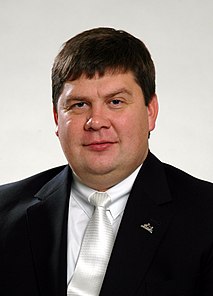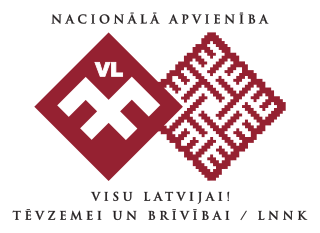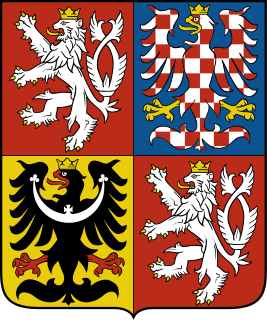The Liberal Party of Andorra is a conservative-liberal political party in Andorra. It is a member of the Liberal International and the Alliance of Liberals and Democrats for Europe.
The Latvian Green Party is a green political party in Latvia. It was founded on 13 January 1990 and is a member of the European Green Party. Unusually for a green party in Europe, the LZP is generally considered a centre-right party. Leading politicians of the party have often supported reactionary, nationalist, and anti-LGBT positions. The party has only gained representation in the Saeima by forming electoral alliances with other parties.

Parliamentary elections were held in Latvia on 3 October 1998. The People's Party emerged as the largest party in the Saeima, winning 24 of the 100 seats.

Parliamentary elections were held in Latvia on 30 September and 1 October 1995. The Democratic Party "Saimnieks" emerged as the largest party in the Saeima, winning 18 of the 100 seats.

Parliamentary elections were held in Latvia on 5 and 6 June 1993, the first after independence was restored in 1991. Latvian Way emerged as the largest party in the Saeima, winning 36 of the 100 seats. A total of 23 parties participated in the elections, although only eight received 4% or more of votes and won seats. Voter turnout was 91.2%, the highest in the country's history. Only 66–75% of Latvian residents qualified to vote, with the majority of those not able to vote being Russian.

Union of Greens and Farmers is a green conservative, agrarian political alliance in Latvia. It consists of two political parties: the Latvian Farmers' Union (LZS) and the Latvian Green Party (LZP). It is the third largest bloc in the Saeima. The Union of Greens and Farmers also cooperates closely with two regional parties: For Latvia and Ventspils and the Liepāja Party.

For Fatherland and Freedom/LNNK was a free market national conservative political party in Latvia. In 2011, it dissolved and merged into the National Alliance.

Aigars Kalvītis is a Latvian politician, former Prime Minister of Latvia and current Chairman of the Board of Latvijas Balzams. Since August 2015, he is CEO of the Latvian gas company Latvijas Gāze.
The Democratic Party is a center-right party in Bulgaria led by Alexander Pramatarski. The party is a member of the European People's Party (EPP).

Parliamentary elections were held in Greece on 31 March 1946. The result was a victory for the United Alignment of Nationalists, an alliance that included the People's Party, the National Liberal Party, the Reform Party, which won 206 of the 354 seats in Parliament. As a result Konstantinos Tsaldaris became Prime Minister leading a right-wing coalition. Nonetheless, he soon decided to resign in favor of Themistoklis Sophoulis, who led a government of national unity during the entire second phase of the civil war (1946–1949). One of the priorities of the new government was the proclamation of a plebiscite for the restoration of the Greek monarchy.

Parliamentary elections were held in Latvia on 7 October 2006. The governing coalition, led by Prime Minister Aigars Kalvītis and his People's Party, won the election. Kalvitis's government thus became the first to be re-elected since Latvia had regained independence in 1991.

The Society for Political Change was a social-liberal political party in Latvia founded on 6 September 2008. Its members include two former ministers, former foreign minister Artis Pabriks and former economics minister Aigars Štokenbergs; its first president was economist Gatis Kokins.

Parliamentary elections were held in Latvia on 2 October 2010. It was the first parliamentary election to be held in Latvia since the beginning of the economic crisis during which Latvia had experienced one of the deepest recessions in the world.
Parliamentary elections were held in Bulgaria on 19 April 1997. The result was a victory for the United Democratic Forces, which won 137 of the 240 seats. Voter turnout was 62.9%. Following the election, SDS leader Ivan Kostov became Prime Minister.
Parliamentary elections were held in Bulgaria on 18 December 1994. The Democratic Left, the core of which was the Bulgarian Socialist Party, won 125 of the 240 seats, enough to govern without the support of parties from outside the coalition. Voter turnout was 75.3%. Following the election, Socialist Party leader Zhan Videnov became Prime Minister.

The National Alliance, officially the National Alliance "All For Latvia!" – "For Fatherland and Freedom/LNNK", abbreviated to NA, is a right-wing populist, national-conservative political party in Latvia. With thirteen seats in the Saeima, the National Alliance is the fourth-largest party in the national parliament and the third-largest party in the government. The party is a coalition of conservatives, Latvian ethnonationalists, and economic liberals.

Early parliamentary elections were held in Latvia on 17 September 2011, following the country's first parliamentary dissolution referendum held on 23 July 2011. The previous parliamentary election was only held in October 2010.

Senate elections for a third of chamber were held in the Czech Republic on 13 and 14 November 1998 with a second round on 20 and 21 November.

The National Liberal Party was a political party in Bulgaria.

The Labour Party is a minor political party in Moldova led by Gheorghe Sima.















